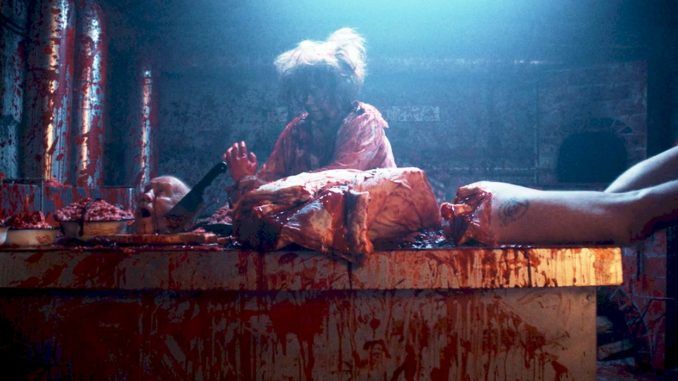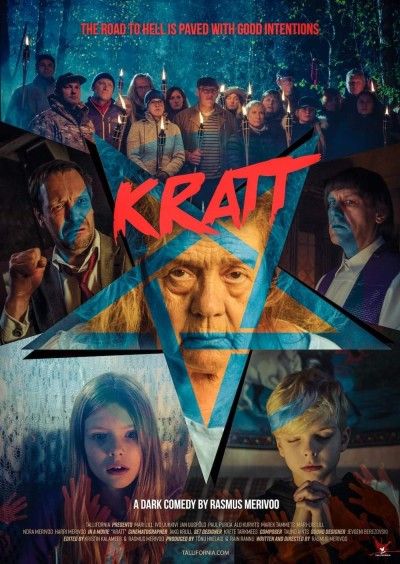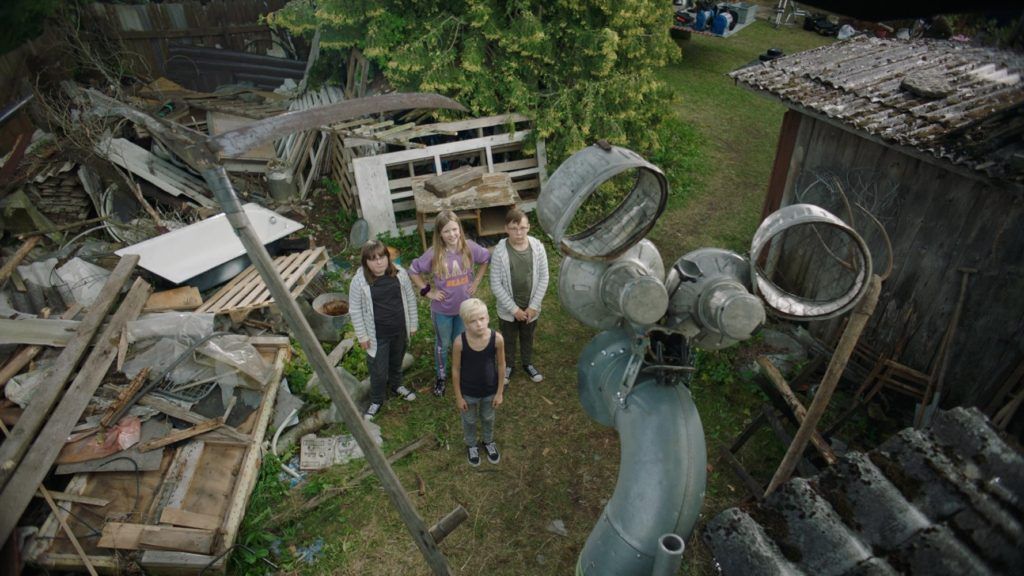
Rating: C
Dir: Rasmus Merivoo
Star: Nora Merivoo, Harri Merivoo, Mari Lill, Ivo Uukkivi
Oh, those wacky Estonians. That’s my conclusion, albeit based on a sample size of precisely one Estonian movie. If you want deeper analysis, it feels like they are a slightly less gloomy version of their neighbours across the Baltic Sea in Finland. There’s the same sense of a cynical eye being cast over proceedings, with a little more warmth in regard to human nature. But the writer-director here really needs to exercise more restraint in terms of his plotting. Just because something seems like a fun or interesting idea – and to be fair, most of those here are that – does not necessarily mean it needs to go into your horror movie. Save some for another film. You can make more than one.
Mia (N. Merivoo) and Kevin (Harri Merivoo) have been dumped at their grandmother’s house in the country. Their parents are heading off to a retreat, and the children are being taking care of by Grandma (Lill). This initially seems the very definition of hell for the young kids: a summer spent without wifi, or their phones. Who’s going to update Mia’s YouTube channel? After they’ve finished sulking, pouting and generally being appalled by country life, they make friends with a pair of local kids. While the gang are looking for the Internet in the library. stumble across a 19th-century diary written by a count (Uukkivi) who was exploring black magic. It details the process to create a kratt, basically a supernatural servant.
 Naturally, the bored kids decide to follow the instructions contained therein. What could possibly go wrong? The initial process goes quite well, but they need to summon Satan and buy a soul from him, in order to finish the process. This comes at a price, and it’s poor Granny who ends up transformed into the kratt [Side-note: this may be the first example I’ve seen in a film of Chekhov’s scythe]. At first, things work swimmingly well. Inevitably, of course, the downside of the change becomes apparent, with the bits the children kinda skimmed in the terms and conditions becoming more apparent. Such as, if the kraat is not kept continuously supplied with tasks, it will eventually turn on its makers.
Naturally, the bored kids decide to follow the instructions contained therein. What could possibly go wrong? The initial process goes quite well, but they need to summon Satan and buy a soul from him, in order to finish the process. This comes at a price, and it’s poor Granny who ends up transformed into the kratt [Side-note: this may be the first example I’ve seen in a film of Chekhov’s scythe]. At first, things work swimmingly well. Inevitably, of course, the downside of the change becomes apparent, with the bits the children kinda skimmed in the terms and conditions becoming more apparent. Such as, if the kraat is not kept continuously supplied with tasks, it will eventually turn on its makers.
This, by itself, would have been a perfectly good basis for a movie. However, Merivoo persists on throwing in a whole bunch of other stuff, which is only tangentially connected to the main plot, if at all. Most obviously, there is a long, meandering side-story involving the local governor (also Uukkivi) and a group of singing environmentalists. The activists are played – and I wrote this down – by “The Choir of Estonian Association of Information Technology and Communications.” They are seeking to prevent the felling of a grove of trees by a landowner, regarding them as sacred. This, as with most of the governor’s shenanigans in small-town politics, have little or no impact. Perhaps this aspect makes more sense to a local audience, better acquainted with the situation?
Slightly better tied-in is the thread involving an Estonian quantum super-computer, which becomes aware of the kraat after the children ask “Vivi”, an Alexa-like device the best way to handle the situation. I was amused by Vivi interpreting their first query, in broken English, as a request for “Dead grandmother blowjob videos.” It also turns out not to be artificially intelligent at all, just connecting the user to child labour operating out of a Russian fentanyl plant. All of a sudden, a lot of things about Alexa make a great deal more sense. However, outside of a rather telegraphed ending, none of this is deeply connected to the main plot either. In general, this is a 113-minute movie which would play better around eighty-five, trimmed of extraneous elements.
When it’s keeping itself constrained to the main plot, it does work quite well. Lill is great, both as the long-suffering grandmother who is largely out of her depth with the younger generation, and as the kraat barking “Give me work!” whenever she runs out of things to do. I’m going to presume the children are played by the director’s real children – it seems likely, unless the name Merivoo is the Estonian equivalent of Smith – and I have to say, they’re both a considerable improvement over Sofia Coppola. I wish the potential genre elements had been used to greater advantage. Outside of an off-hand request to turn the governor’s political opponents into pizza, which the kraat obeys to the letter (top), this plays more like a quirky comedy about occult possession than true horror.
 As such, the effects are functional rather than particularly impressive: they do the job. I’ wanted to see the kraat constructed by the children come to life, a fifteen-foot high creature (above) made from farm implements. I did like the idea of the devil being played by a little person, one blamed by the local priest for all society’s ills, including crop failures, school shootings, contemporary art and gay propaganda. “Isn’t it a bit of a cliché to blame Satan for everything?” responds, um, Satan. “Perhaps some tolerance is in order?” However, it’s another angle that is merely toyed with, like the priest here plays with a drone, and to similarly minor effect.
As such, the effects are functional rather than particularly impressive: they do the job. I’ wanted to see the kraat constructed by the children come to life, a fifteen-foot high creature (above) made from farm implements. I did like the idea of the devil being played by a little person, one blamed by the local priest for all society’s ills, including crop failures, school shootings, contemporary art and gay propaganda. “Isn’t it a bit of a cliché to blame Satan for everything?” responds, um, Satan. “Perhaps some tolerance is in order?” However, it’s another angle that is merely toyed with, like the priest here plays with a drone, and to similarly minor effect.
I can’t say I felt like the time was wasted. I certainly wanted to keep watching, just to see what was going to happen next, and there are enough moments of genuine amusement to make it worthwhile. However, it ends up being too scatter-gun an approach to succeed, and would have benefited from more commitment to the idea at its core. Instead I’m left with a suspicion Merivoo didn’t have enough faith in his own central concept, or maybe in his own offspring, and adopted a kitchen-sink approach to his screenplay instead. While the results don’t put me off further exploration of Estonian cinema, nor do they do much to encourage it.
This review is part of our October 2024 feature, 31 More Countries of Horror.
